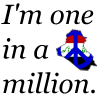UFPJ and A.N.S.W.E.R.: Irreconcilable Differences
The leadership of United for Peace and Justice have announced that they will no longer attempt to coordinate demonstrations and national actions with ANSWER. This comes after many debates about the logistics of the September 24 march in D.C. and the seeming inability to reconcile their 'differences'. And locally, many are split on their views as well. While some continue to cite the need for unity and collaboration, others are cheering the move and suggest ties might have been severed sooner rather than later.
I just labored over the public statements of both organizations, and the subsequent statements of many local groups in response (too lengthy to post) many of whom belong to one or both of these coalitions. Some of our local groups actually wrote letters to apply pressure in favor of a split, while others are at this moment urging their rank and file to contact UFPJ to reconsider for what they perceive as the sake of unity.
It begs peaceniks everywhere to consider the question: when is it time to cut our losses, and when is it time to force the issue in the name of cooperation? Is it about a rivalry, or much more? What about the groups' views on the Middle East, Israel, race, and imperialism? From where do they depart? And how horrible would it be to simply have two large entities working alongside? Why not just give them our blessings and continue our efforts on the REAL war?
Having attended the marches and rallies in question, and considered some of the language/positional matters carefully, I still cannot gage my own position on this. Ideally, I want the passion and global view of ANSWER to get in bed with the mainstream lure of UFPJ. My friends will say that my distaste for ANSWER's antics is rooted in my concern with media/public opinion and because I view them as the occasional liability I seek to ditch the baby with the bath water. Not true. Its a pro/con matter that history seems to have answered for itself.
It isn't impossible for me to wrap my brain around the positive implications of a partnership. I suppose I just think it needs to be a legitimate partnership rooted in a mutual desire to commit to cause, not because peacenik divisiveness is so taboo. I mean, WHY must there be unity? For its own sake?
(Perhaps I secretly wonder if unity constitutes putting all of our eggs in one basket. Betting on just one horse. What they call 'diluting the message' can sometimes be called 'diversity'. Multiple fronts.) When people claim that the numbers would not have been as high at the September march, I make the following observations: that the media underreports attendance anyway, that the media did not help matters by showing the less attended ANSWER stage, and that few benefits could be derived from the media coverage of the incessant fighting. There might have been fewer attendees, on that I cannot speak. But how can we measure damaged credibility or public perception? The silliness of the two stages, two start times, two speakers talking at the same time... became the subject of wingnut kneeslapping. And after the confusion, standing around for hours, and disjointed logistics, how will people view participating the nect time? Might it hurt future attendance, the chaos?
We are so defensive about plural voices nowadays, and liberal dissent-in response to the observations that 'the right' draw strength from their homogeny. We seem to demand that the left emulate their paths of least resistance. But would it have been better, in hindsight, to have let it go? Agree to disagree sometimes?
I think the split has been there, glaringly obvious, and that the many attempts to 'unite' have been disingenuous. The illusion was not successful, so what was gained by the pretense?
After the September march in DC for example, there were violations of the agreements reached by both sides. So what do we make of this?
How did the participation of ANSWER and the extended coverage by CSPAN impact the media and public perception of the message? Are we to be concerned with the organization's core positions or the way they articulate their message via their speakers and public statements? Was the purpose to convey a unified message of troop withdrawl- and did the united efforts do more to help or hinder that goal?
After the march, the media here showed multiple images of the seemingly sparse ANSWER stage, if they covered the march at all. As a participant, it seemed that there was a huge lag and confusion about the departure from the UFPJ stage which was later explained when we learned that ANSWER had extended their speaker time and the march was effectively delayed an hour. The UFPJ folks seem to think that ANSWER played dirty with the logistics of the day and further, were stingy with their help.
A statement from a New York based peace group described the need for unity regardless. While they remain steadfastly critical of the split, others are not so sure. They point to the very public sparring between the two and feel that their association is better left to settle in its tatters. Time to let it go.














2 comments:
ANSWER tends to lose focus and throw too much into the pot. I am not sure why everyone rpessures them to get together. is it like liberal law that groups must collaborate for supposed 'strength"?
Hi, your blog is wonderful! I just wanted to tell you about this site of mine about giochi . You can reach it typing http://www.giochi-scommesse.com in your browser window or clicking on the link below!
Only giochi .
Post a Comment